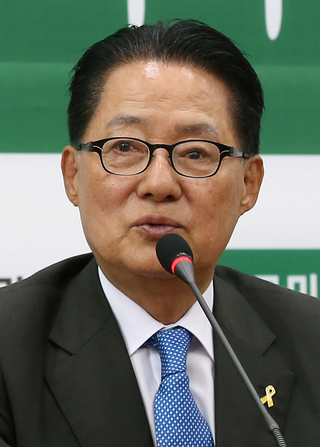
The history of South Korea begins with the Japanese surrender on 2 September 1945. At that time, South Korea and North Korea were divided, despite being the same people and on the same peninsula. In 1950, the Korean War broke out. North Korea overran South Korea until US-led UN forces intervened. At the end of the war in 1953, the border between South and North remained largely similar. Tensions between the two sides continued. South Korea alternated between dictatorship and liberal democracy. It underwent substantial economic development.

The president of the Republic of Korea, also known as the president of South Korea (Korean: 대통령), is the head of state and head of government of the Republic of Korea. The president leads the State Council, and is the chief of the executive branch of the national government as well as the commander-in-chief of the Republic of Korea Armed Forces.

Syngman Rhee was a South Korean politician who served as the first president of South Korea from 1948 to 1960. Rhee is also known by his art name Unam. Rhee was also the first and last president of the Provisional Government of the Republic of Korea from 1919 to his impeachment in 1925 and from 1947 to 1948. As president of South Korea, Rhee's government was characterised by authoritarianism, limited economic development, and in the late 1950s growing political instability and public opposition.

Kim Dae-jung was a South Korean politician and activist who served as the 8th president of South Korea from 1998 to 2003.
The Liberty Korea Party (Korean: 자유한국당) was a conservative political party in South Korea that was described variously as right-wing, right-wing populist, or far-right. Until February 2017, it was known as the Saenuri Party, and before that as the Hannara Party from 1997 to 2012, both of which are still colloquially used to refer to the party. The party formerly held a plurality of seats in the 20th Assembly before its ruling status was transferred to the Democratic Party of Korea on 27 December 2016, following the creation of the splinter Bareun Party by former Saenuri members who distanced themselves from President Park Geun-hye in the 2016 South Korean political scandal.

South Korea competed as Korea at the 2000 Summer Olympics in Sydney, Australia. Athletes from North and South Korea marched together in the opening ceremony under the Korean Unification Flag. 281 competitors, 175 men and 106 women, took part in 144 events in 26 sports.

Park Geun-hye is a South Korean politician who served as the 11th president of South Korea from 2013 to 2017, when she was impeached and convicted on related corruption charges.

The Third Republic of South Korea was the government of South Korea from December 1963 to November 1972. The Third Republic was founded on the dissolution of the Supreme Council for National Reconstruction that overthrew the Second Republic and established a military government in May 1961. Park Chung Hee, the Chairman of the Supreme Council, was elected President of South Korea in the 1963 presidential election.

The Fourth Republic of Korea was the government of South Korea from November 1972 to March 1981.

The Fifth Republic of South Korea was the government of South Korea from March 1981 to December 1987.

Presidential elections were held in South Korea on 19 December 2012. They were the sixth presidential elections since democratization and the establishment of the Sixth Republic, and were held under a first-past-the-post system, in which there was a single round of voting and the candidate receiving the highest number of votes was elected. Under the South Korean constitution, a president is restricted to a single five-year term in office. The term of the then incumbent president Lee Myung-bak ended on 24 February 2013. According to the Korea Times, 30.7 million people voted with turnout at 75.8%. Park Geun-hye of the Saenuri party was elected the first female South Korean president with 51.6% of the vote opposed to 48.0% for her opponent Moon Jae-in. Park's share of the vote was the highest won by any candidate since the beginning of free and fair direct elections in 1987 and the first such election in which any candidate won a majority. Moreover, as of the 2022 election, this is the latest South Korean presidential election in which the winning candidate won an absolute majority of the vote.

Moon Jae-in is a South Korean politician who served as the 12th president of South Korea from 2017 to 2022. Prior to his presidency, he served as Senior Secretary for Civil Affairs and Chief of Staff to President Roh Moo-hyun, Member of the National Assembly, and Leader of the Democratic Party of Korea.

Early presidential elections were held in South Korea on 9 May 2017 following the impeachment and removal of Park Geun-hye. The elections were conducted in a single round, on a first-past-the-post basis, and had originally been scheduled for 20 December 2017. However, they were brought forward after the decision of the Constitutional Court on 10 March 2017 to uphold the National Assembly's impeachment of Park. Following procedures set out in the Constitution of South Korea, Prime Minister Hwang Kyo-ahn succeeded Park as the acting president. After Park was removed from office by the Constitutional Court's ruling, acting president Hwang announced he would not run for a term in his own right.

Park Jie-won is a South Korean politician who served as Director of the National Intelligence Service. He was the chief presidential secretary to President Kim Dae-jung, and served as the Minister of Ministry of Culture, Sports and Tourism and coined the term "Esports" during his administration. On 9 April 2008, he was elected as a member of 18th National Assembly of South Korea for Mokpo as an independent. After being elected, he returned to the Democratic party. In May 2012, he became the floor leader for the Democratic United Party.
Events from the year 1979 in South Korea.
Events from the year 1985 in South Korea.
The People Party was a centrist political party in South Korea established on 2 February 2016 by Ahn Cheol-soo. The party had a strong support base in the Honam region. The party dissolved on 13 February 2018. A later party of the same name was also founded by Ahn and was active from 2020 to 2022.
Presidential elections in South Korea determine who will serve as the President of South Korea for the next five years.

North Korea–Venezuela relations are relations between the Democratic People's Republic of Korea and the Bolivarian Republic of Venezuela. Venezuela is one of the five countries in Latin America that has an embassy of North Korea along with Brazil, Colombia, Cuba and Nicaragua. However, Venezuela is one of the only countries in the world that has a good relationship with both North and South Korea.

Designated Survivor: 60 Days is a 2019 South Korean television series written by Kim Tae-hee, directes by Yoo Jong-sun, and starring Ji Jin-hee, Lee Joon-hyuk, Huh Joon-ho, Kang Han-na, and Bae Jong-ok. Based on an American television series Designated Survivor, this series aired on tvN from July 1 to August 20, 2019, every Monday and Tuesday at 21:30 (KST).













